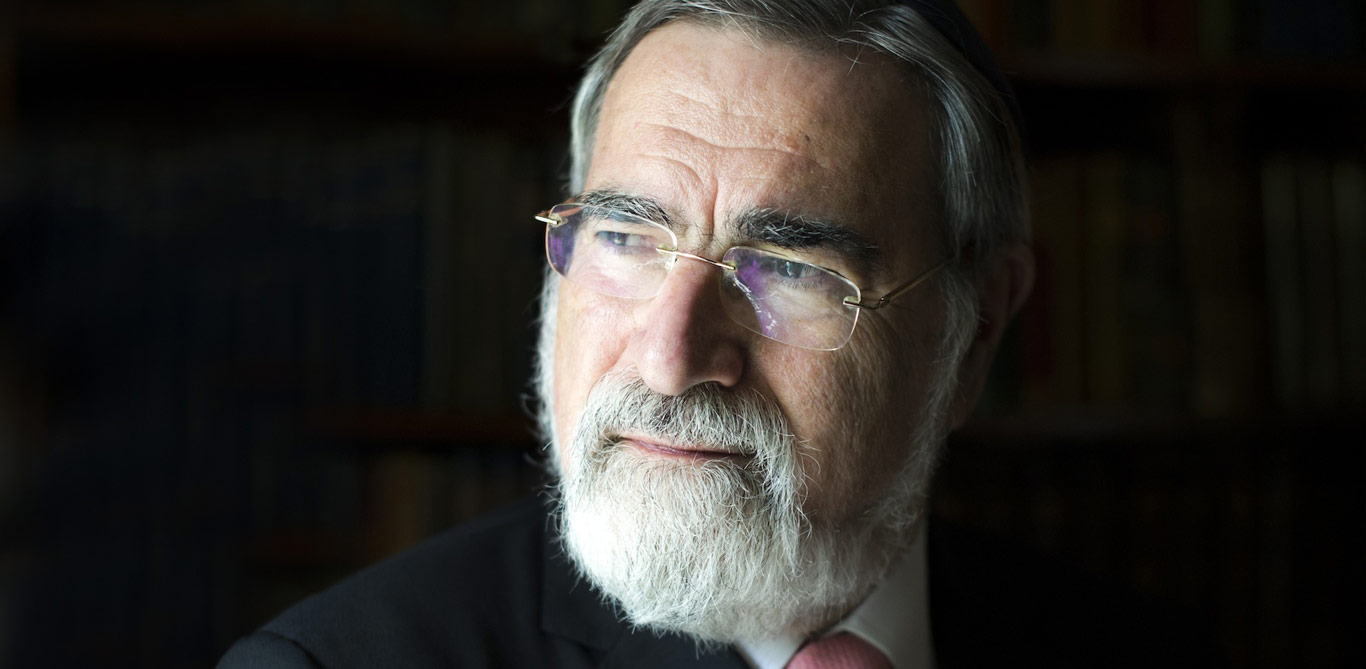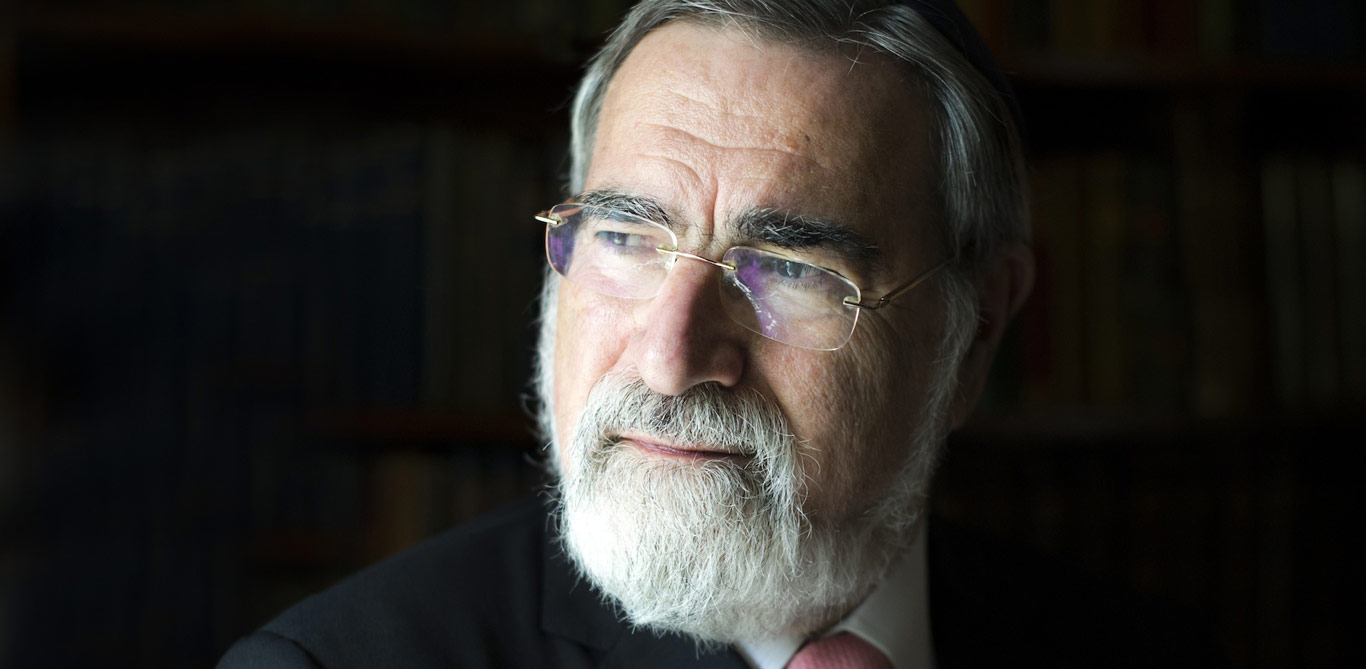I. The Problematic Theology of the Stranger
Rabbi Jonathan Sacks, zt”l, whose first yahrzeit falls this year on October 26 (20 Cheshvan), opened up Jewish thought to a broader audience with his prolific writing and speaking about ideas in ways that were both eloquent and accessible. To a surprising degree, he was able to transcend denominational, ethnic and religious communities without sacrificing his traditional Orthodox Jewish beliefs. That makes the following idea even more challenging.
Time and again, Rabbi Sacks wrote about the significance of the stranger in Jewish thought and its relevance to contemporary times. In “The Dignity of Difference,” Rabbi Sacks says (p. 58): “Nowhere is the singularity of biblical ethics more evident than in its treatment of the issue that has proved to be the most difficult in the history of human interaction, namely the problem of the stranger, the one who is not like us.” Rabbi Sacks continues that, unlike most societies (p. 58): “As the rabbis noted, the Hebrew Bible in one verse commands, ‘You shall love your neighbor as yourself,’ but in no fewer than 36 places commands us to ‘love the stranger.’” He emphasizes (p. 59): “God cares about the stranger, and so must we.”
He sees in these commandments, and in a variety of biblical narratives that he ably interprets as teaching this theme, the need in all generations—and particularly ours—to care for those who are different, who are out of their element and somehow strangers in our midst. This is an important Torah value for Jews, who follow the commandments within the Mosaic covenant, and for all people throughout the world. Throughout his writings, Rabbi Sacks continues in his consistent reading of these biblical passages as a universal command to love and assist anyone who needs that help, any “stranger.” And therein lies the problem.
II. The Talmudic Stranger
The Torah commands, “And you shall not mistreat a stranger (ger), nor oppress him, because you were strangers (gerim) in the land of Egypt” (Ex. 22:20). Similarly, “And you shall love the stranger (ger) because you were strangers (gerim) in the land of Egypt” (Deut. 10:19). Our experience as strangers in Egypt must inform our treatment of strangers today.
Judaism sees two meanings in the term ger (stranger): 1) a ger tzedek is a convert to Judaism, 2) a ger toshav is a gentile who fulfills the Noahide covenant (according to some interpretations, it is a gentile who rejects idolatry). The Talmud and Midrash interpret the various biblical usages of the term ger in either of these ways. Regarding the commandment that prohibits mistreating the ger, the Talmud (Bava Metzia 59b) clearly says that this ger is a full-fledged Jew, in other words a ger tzedek (convert). We are specially obligated to love converts and refrain from mistreating or oppressing them. This obligation to the convert is formally recorded in Jewish legal codes (Mishneh Torah, Hilchot Dei’ot 6:4, Hilchot Mechirah 14:15-16; Shulchan Aruch, Choshen Mishpat 228:2; Magen Avraham 156:1).
If so, this undercuts Rabbi Sacks’ entire theology of the stranger. The Talmud reads the Bible as commanding us to give extra care to those who join the Jewish people as converts. They used to be outsiders and might still feel like outsiders to some degree. Therefore, we must welcome them with extra kindness. Where is there room for a universal welcome to all strangers? When the Sages say that the Torah states at least 36 times that we must love the stranger (Bava Metzia 59b), which Rabbi Sacks invokes (e.g., “To Heal a Fractured World,” p. 103), the Sages are referring to a convert to Judaism!
III. Who Is a Stranger?
However, any challenges should be directed not at Rabbi Sacks but at his Medieval precedents. In his main analysis of this subject directed at a Jewish audience (“Commentary & Conversation,” ibid.), Rabbi Sacks quotes Ramban (Nahmanides, 13th cen., Spain; commentary to Ex. 22:20) and Rav Chaim Ibn Attar (18th cen., Israel; Or Ha-Chaim, Ex. 22:20) who explain the powerlessness and vulnerability of the stranger and the need for Jews to remember their own history as strangers. The words of these commentators point to a concern for the outsider, the less fortunate, the vulnerable. These concerns apply universally, to all strangers.
Rabbi Sacks was looking more to sharpen his point than to prove it. If he had wanted to demonstrate the authenticity of his approach, he might have quoted Sefer Ha-Chinuch (anonymous, 13th cen., Spain; Mitzvah 431). The Chinuch follows the Talmud in saying that the commandment to love the stranger (Deut. 10:19) applies only to a convert to Judaism. However, he adds: “And we should learn from this precious commandment to have mercy on a man who is in a city that is not the land of his birth and the place of the family of his fathers…”
Sefer Ha-Chinuch sees the idea underlying this commandment as a universal idea to care for anyone who is a stranger. Any foreigner in a foreign land needs emotional and physical support. If anyone should know this based on personal experience it is the Jewish people. This was true when we emerged from exile in Egypt and became even truer after millennia of exile and wandering, when we were strangers even in foreign lands where our ancestors had lived for generations. The Jews outside of Israel are the prototypical strangers. We must, therefore, empathize with anyone else who becomes a stranger. The Sefer Ha-Chinuch serves as a strong precedent for Rabbi Sacks’ theology of the stranger. Indeed, after seeing this text, it seems more like Sefer Ha-Chinuch’s theology of the stranger than Rabbi Sacks.’
Rav Avraham Ben Ha-Rambam (13th cen., Egypt, son of Maimonides), in his commentary to the verse prohibiting the mistreatment of a stranger (Ex. 22:20), writes: “The simple meaning of the verse is that ger refers to a foreigner where he lives, as it says ‘because you were strangers…’ The Sages interpreted it as a convert. It is possible that the intent is for both—a stranger and a convert.” Rav Avraham Ben Ha-Rambam explicitly includes the stranger—not just a convert—within the Torah’s command.
IV. Resolving the Contradiction
And yet, despite the substantive precedents for this theology of the stranger, we remain with the contradiction to the Talmud. Set aside Rabbi Sacks; how could the author of Sefer Ha-Chinuch and Rav Avraham Ben Ha-Rambam interpret the verses about the stranger as referring to any stranger when the Talmud says it refers to a convert? There are two answers to this question.
Note the language of Sefer Ha-Chinuch as it progresses to discussing the general stranger: “And we should learn from this precious commandment…” Sefer Ha-Chinuch locates the underlying spirit of the law about the treatment of a convert and applies it non-legally to a universal stranger. Rav Yosef Babad (19th cen., Ukraine; Minchat Chinuch 431:3) asks how the Sefer Ha-Chinuch could interpret this verse as referring to any stranger rather than a convert. He answers that the Sefer Ha-Chinuch meant this as an ethical imperative (derech ha-mussar) and not a legal obligation. It is proper, compassionate and ethical to care for any stranger in a foreign land. It is religiously obligatory only to care for a convert.
Rav Avraham Ben Ha-Rambam takes a different, more daring path. He suggests that the verse refers both to a foreigner (as per the simple reading) and a convert (as per the Talmudic tradition). Both are proper readings and religious obligations. We accept both the simple reading (peshat) and the rabbinic reading (derash) as religious obligations. This approach raises many possibilities and questions, which due to space constraints I can only explore in more depth on TorahMusings.com.
Rabbi Sacks’ theology of the stranger follows Medieval precedent in reading the text and applying it in practice. Since his suggestion has important precedents, Rabbi Sacks’ theology of the stranger stands on solid ground of Medieval texts, with the approval of the Minchat Chinuch. In particular, since Rabbi Sacks generally offers this theology to a gentile audience that is not obligated in the Mosaic commandments, the ethical understanding rightly takes priority. And even when addressing a Jewish audience, Rabbi Sacks presents his understanding on the ethical plane, not the legal, because his is a theology of the stranger and not a commandment regarding the stranger.
As we take leave of our first full year without Rabbi Sacks, we would do well to look back at his ethical teachings. In this confused world, with many moral compasses pointing in the wrong directions, Rabbi Sacks’ memory and teachings guide us toward the path of responsibility and sanctity.
Rabbi Gil Student is editor of TorahMusings.com.











